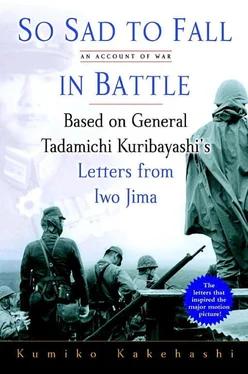Takako is aware of this, but she still maintains that her father died happy.
“Why? Because no matter how awful things were, the soldiers all believed in my father and stuck with him to the end. Surely there’s no greater happiness for someone in the position my father was in.”
“Tako-chan”—now far older than her father when he died at the age of fifty-three—delivered this remark with a firm voice and a smile on her face.
I went to Takako’s house three times to speak with her. The last time was a cold day in January 2004. She came down to the front gate to see me off and pushed some chocolate into my coat pocket, saying, “Have this on the bus on your way home.”
It was six months later that I heard she had died.
KURIBAYASHI’S WIFE, YOSHII, had died the year before, in 2003. Her husband had written her: “Henceforth our fearful destiny is to lose this war…. It is crucial that, woman though you are, you be strong—strong so you can live through it all.” And she lived on for fifty-eight years after the war, her long life finally coming to an end at the age of ninety-nine.
The Kuribayashis were married on December 8, 1923. Kuribayashi was thirty-two, his wife nineteen.
Kuribayashi had graduated from a middle school (under the old system), then went on to the Military Academy. After being made a second lieutenant, then a first lieutenant in the cavalry, he proceeded to the Army War College, an elite training institution where officers studied in order to command division-size or greater units.
Apparently senior officers approached Kuribayashi, who graduated from the Army War College second in his class, with offers of their daughters’ hands in marriage. But Kuribayashi turned them all down to wed Yoshii, who came from the same region of Japan that he did.
Yoshii was the daughter of a landowner in Higano, near Kawanakajima, the site of a series of famous battles in the sixteenth century. Her maiden name was Kuribayashi, too, but this was merely coincidental, and they were not related. According to Kuribayashi Matsue, Yoshii’s sister-in-law, the couple met at a miai , or “arranged meeting,” that came about through the introduction of a dyer who was a frequent visitor to both households.
Kuribayashi seems to have doted on Yoshii, who was thirteen years his junior. After the war, Yoshii remembered her husband like this:
He was very punctilious and exact; whatever he did, he liked to do it efficiently. But if I was working late in the kitchen, he would say: “Don’t worry. Just leave things as they are and go off to bed.” He was a very thoughtful person. [2] From the series “Wives of the Famous Generals,” Shôsetsu Hôseki magazine, November 1970.
With only one elder brother, Yoshii had few siblings for a family of the time. As a result, she was the apple of her parents’ and her big brother’s eyes. Her sister-in-law Matsue says, “She was brought up like a lady,” and as an unmarried girl she was terribly shy. “When the draper came by and she had to choose a piece of something, she would be so embarrassed that she would run off into the back room and not come out.” “Above all, Mother was a kind and gentle person,” says Tarô, her son. “She was quite easygoing, and may have seemed a bit careless to my father, who was more highly strung.”
Kuribayashi clearly worried a great deal about Yoshii, and the letters he sent from Iwo Jima overflow with expressions of concern for her. In earlier chapters I quoted from letters in which Kuribayashi was worrying about everything from drafts in the kitchen to her chapped skin and what to do about dirt in the bathtub, but there are also many passages in which he frets about her health, as can be seen from this letter, dated October 4, 1944:
Perhaps I’m just worrying too much, but recently I had a dream in which you looked terribly gaunt and your eyes were shining feverishly. Are you getting the massage lady to come? Make sure to take a bath about twice a week to improve your circulation and avoid hardening of the arteries.
And from this one, dated October 10, 1944:
“Clearly, stuffing gunpowder into bags isn’t an easy job. You must get stiff shoulders. I’m really sorry for you. It’s important for you not to overdo it. Overdoing things will be bad for your health.”
Stuffing gunpowder bags is likely to have been a form of labor service, with each house having a quota to fill. Yoshii must have sent Kuribayashi a letter complaining about what awful work it was, and he is writing back to her with extraordinary sweetness. After all, on his side he had more than stiff shoulders to worry about, as with Iwo Jima subjected to round-the-clock air raids and naval barrages he was having to sleep in an underground shelter.
As with this letter about stuffing bags with gunpowder, Kuribayashi was always very careful to address all the points that his wife raised in her letters. This from a letter dated August 31, 1944:
On the subject of using naphthalene to kill ants, these ants are just not the kind of ants that you can get rid of that way. They’re all over everything—on the ground, on tree trunks, on the pillars of the houses, on the walls of the houses. Unbearable. But at least they go back to their nest at night, so there are far fewer of them then.
And from September 20, 1944:
I read the clipping from Shufu no Tomo ( The Housewife’s Friend ) magazine. Tragedies like that are happening everywhere. We’re in a war, so be thick-skinned and just accept these things. If you start worrying about everything that’s happening, you’ll just get depressed.
You might not expect a soldier at the front to have the time or the inclination to deal with questions about the suitability of naphthalene for ant extermination, or clippings from women’s magazines, but Kuribayashi’s replies dealt scrupulously with every point. For a wife to write to her husband, who happened to be a lieutenant general, about air raids and the course of the war would normally have been considered forward and impudent in this period.
Kuribayashi loved the childish sincerity and desire to be helpful that saw his wife trying to send naphthalene to the front. Clearly they had the sort of relationship where they could tell each other what they were really thinking. For his part, Kuribayashi shared honest opinions with her that he could not reveal to anyone else: “What a pity that I have to bring the curtain down on my life in a place like this because of the United States” (September 12, 1944); “If things were normal and this great war weren’t on, we’d all—you, the children, and me—be having such a nice, happy life right now” (November 26, 1944). Reading their letters, you feel you are listening in on the couple having a chat.
From December 8, 1944:
You’ll get cold sometimes when you’re in the air-raid shelter, so you need to prepare a small foot warmer or a hot-water bottle. You’ll need a blanket, too. And make sure you’ve got straw matting.
From December 11, 1944:
Please take good care of yourself. Make sure to wear a stomach band and a waistcloth so you don’t get cold. Instead of underwear, I suggest you wear my camel hair shirt. I imagine there isn’t much heat, so it’s important to dress up warm.
From December 15, 1944:
Now, let’s talk about clothes. In my previous letter, I recommended tie-up straw sandals, but what do you think about my old lace-up boots? The best thing is to try all sorts of things and see what works.
From December 22, 1944:
I mentioned my lace-up boots in my last letter, but they may be in really bad condition, so what about my army boots? You could probably wear them over your tabi socks…. My army boots are in the box full of shoes that I tidied up. (It’s in the second-floor guest room.)
Читать дальше












